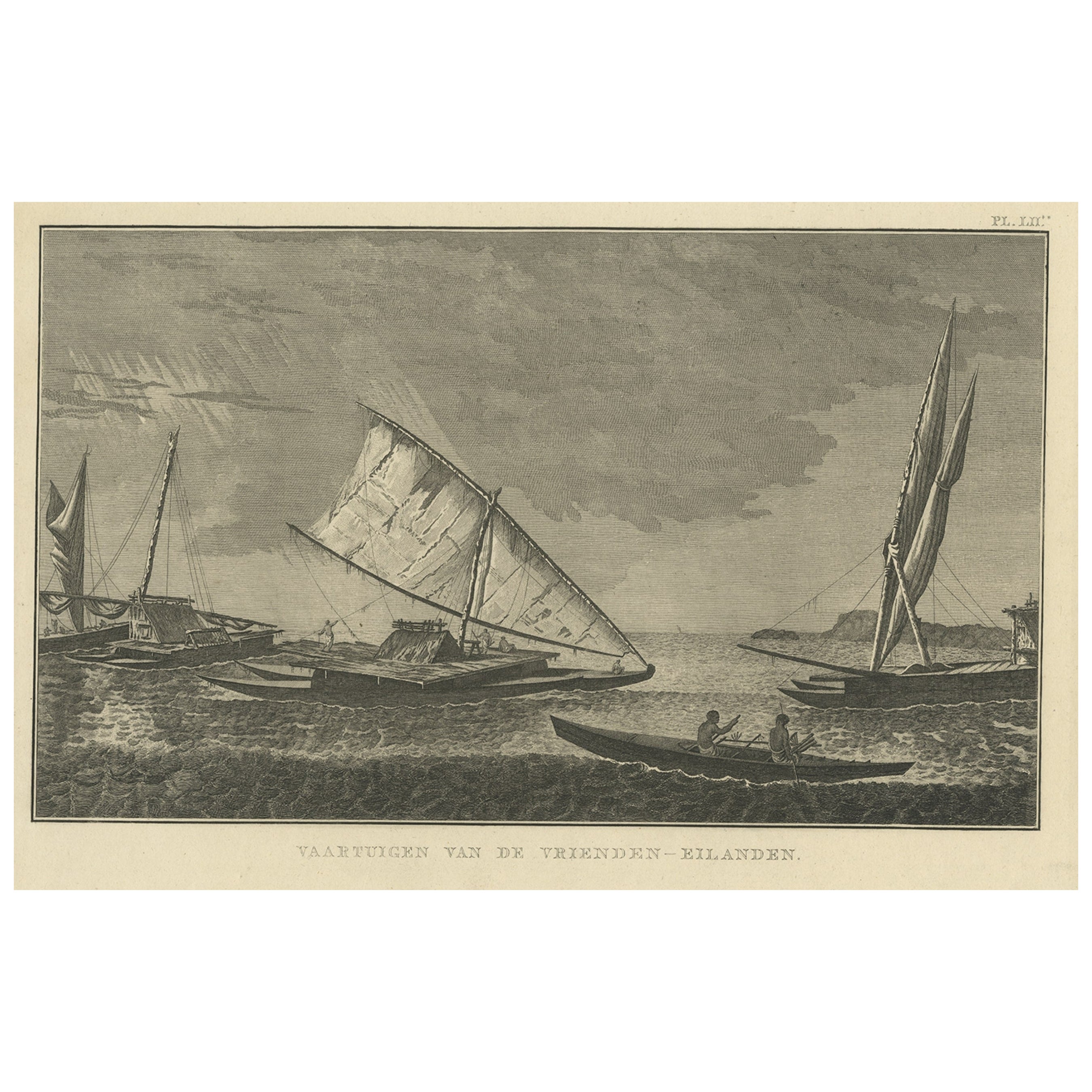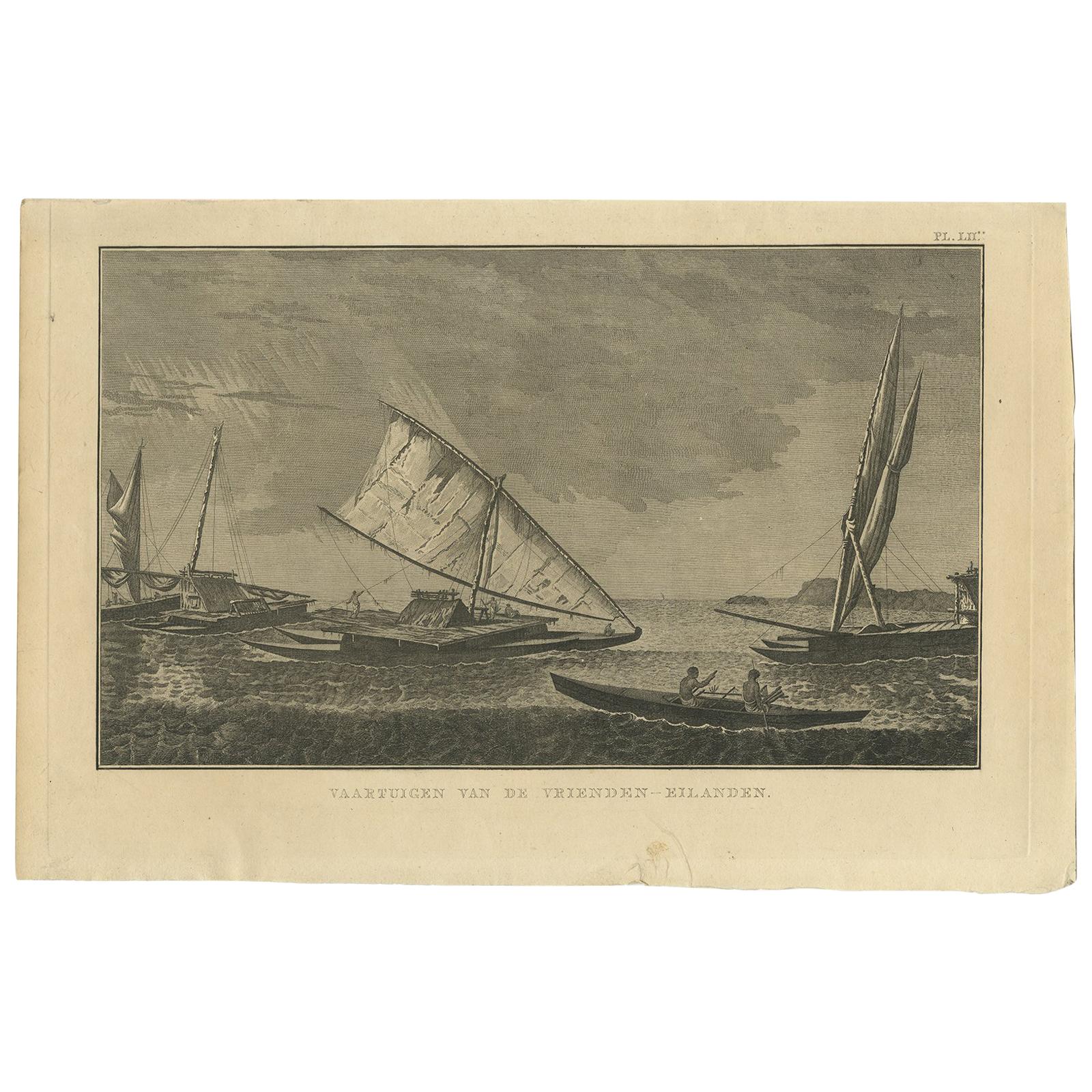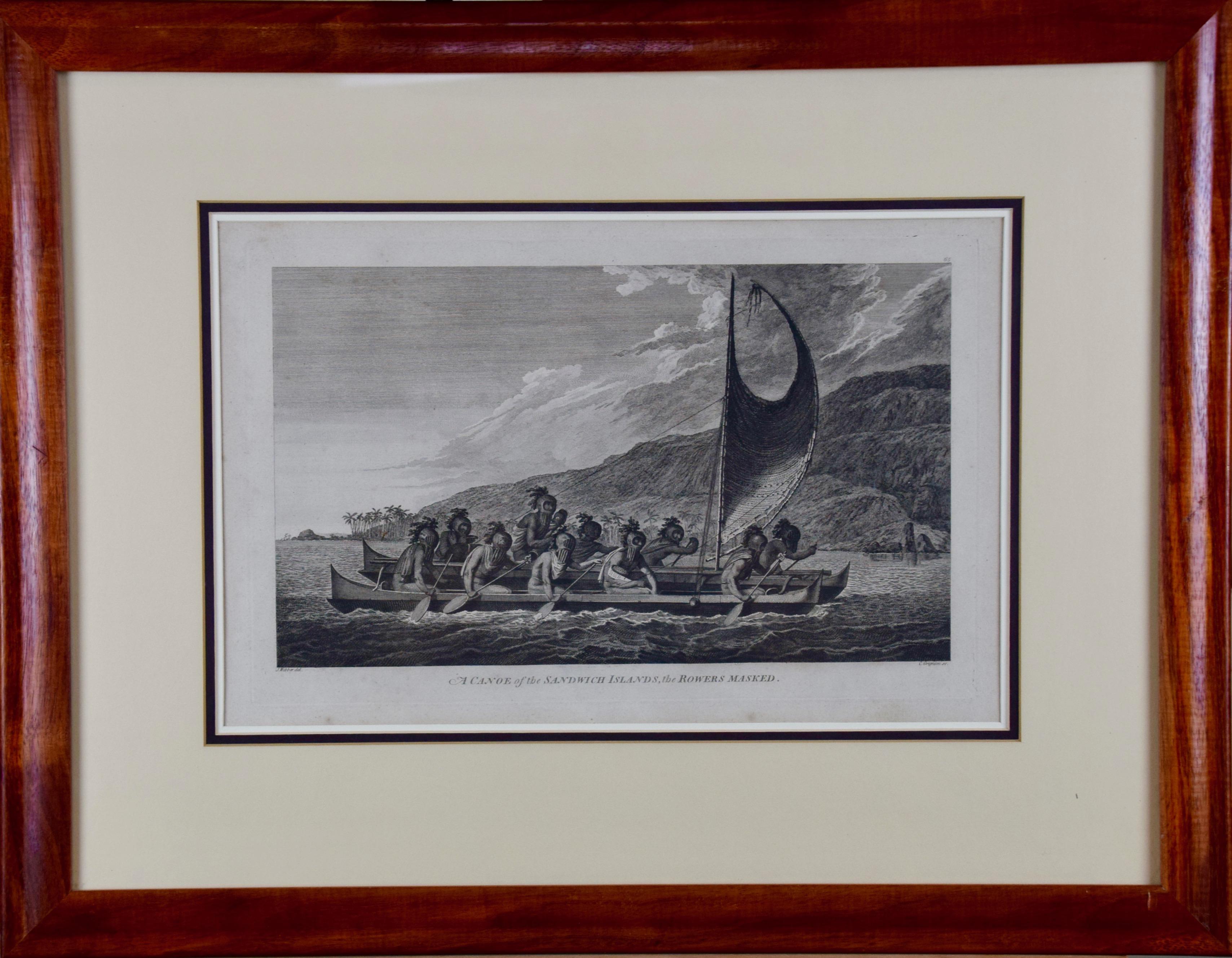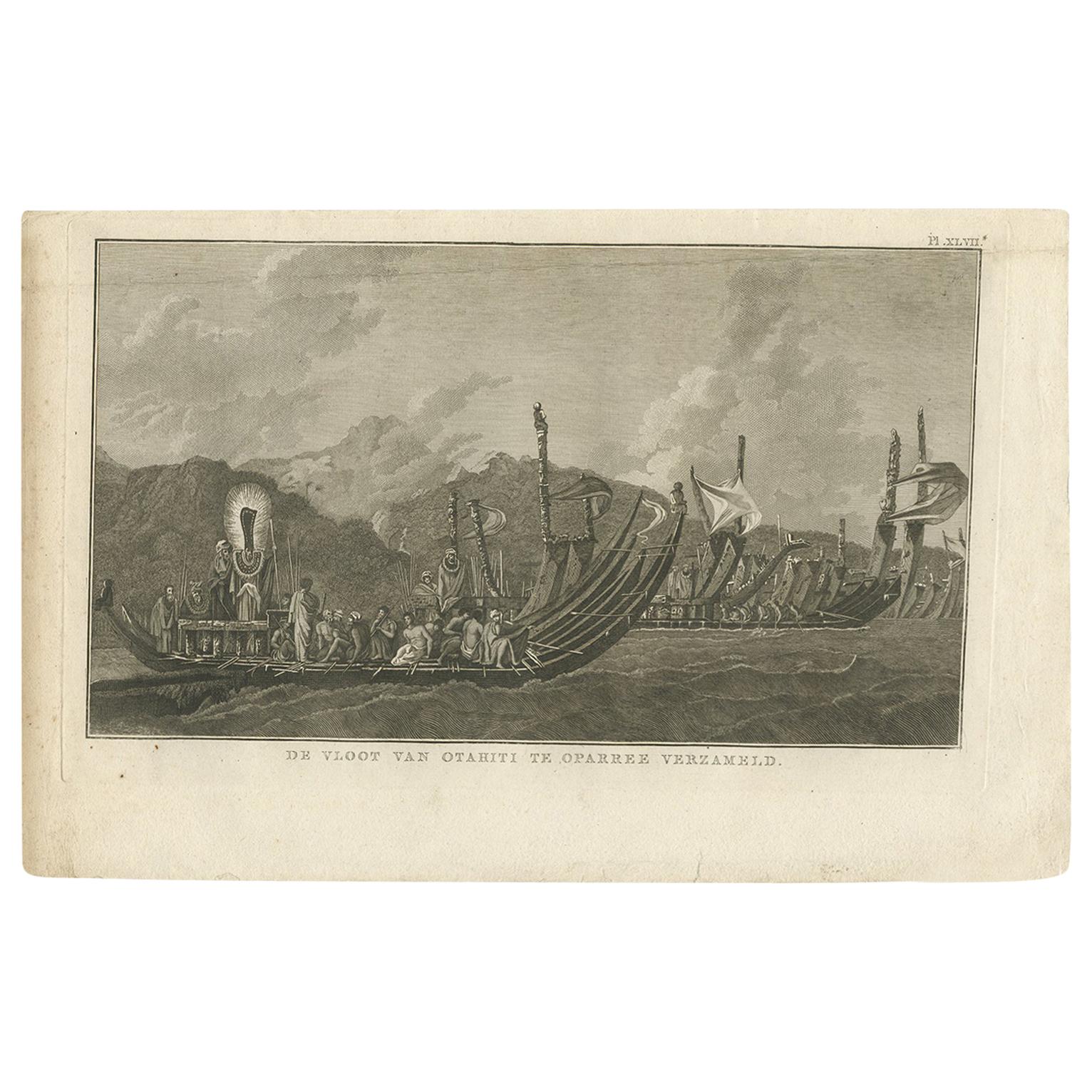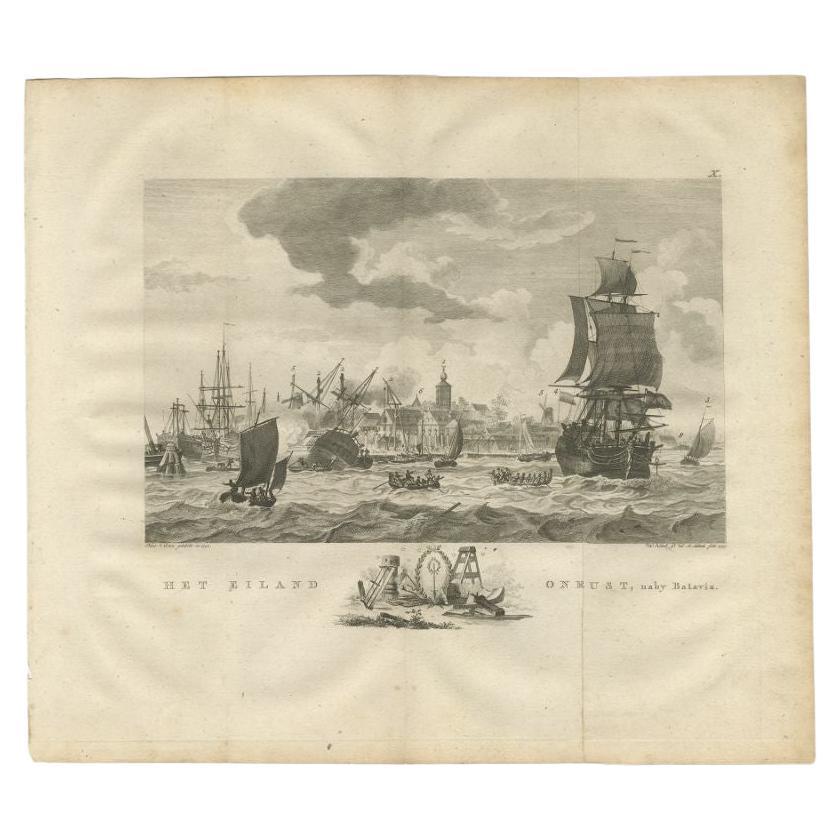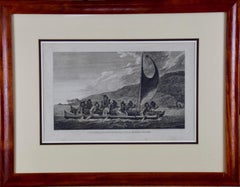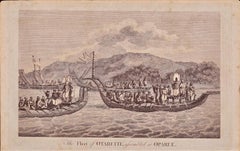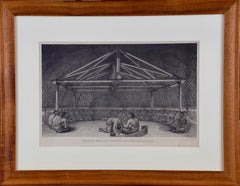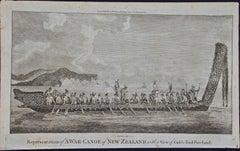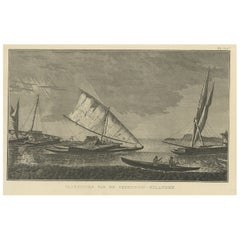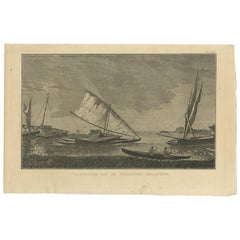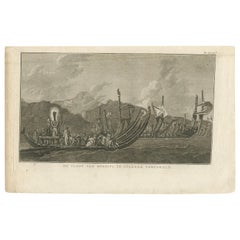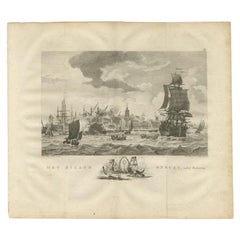Items Similar to Boats of the Friendly Isles, Tonga: Original 18th C. Engraving from Captain Cook
Want more images or videos?
Request additional images or videos from the seller
1 of 5
William HodgesBoats of the Friendly Isles, Tonga: Original 18th C. Engraving from Captain Cook1785
1785
$200
$25020% Off
£154.18
£192.7220% Off
€175.24
€219.0520% Off
CA$284.97
CA$356.2120% Off
A$310.02
A$387.5220% Off
CHF 163.59
CHF 204.4920% Off
MX$3,728.51
MX$4,660.6420% Off
NOK 2,063.65
NOK 2,579.5620% Off
SEK 1,920.55
SEK 2,400.6920% Off
DKK 1,308.76
DKK 1,635.9420% Off
About the Item
"Boats of the Friendly Isles" is an original 18th century engraving from a drawing by William Hodges (1744-1797), who was the artist who accompanies Captain Cook on his second voyage of discovery (1772-1775). The engraving appeared in Alexander Hogg's publication "A New, Authentic, and Complete Collection of Voyages Round the World" published in London in 1785.
This engraving depicts three sail boars crewed by Polynesians in Tonga. Each boat has a small structure on a platform for storage of supplies or to provide the crew shelter from the elements. Captain Cook discovered the islands of Tonga in October, 1773 and returned in 1774. He named the island the Friendly Isles because of the warm reception he and his crew of his two ships Resolution and Adventure received. By some accounts by sailors who were there, the Tongans had actually planned to attack Cook, but the action was called off when they could not agree whether to attack during the day or at night.
The engraving is printed on laid chain-linked paper. The sheet measures 9.63" in height and 15.25" in width. There is a small chip at the lower edge of the left lower corner, smudges in the left upper corner, a tiny spot in the image adjacent to the sail of the middle boat and small ink spots in the upper margin, presumably occurring at the time the engraving was printed in the 1780's. The print is otherwise in very good condition.
Alexander Hogg was an 18th and early 19th century publisher of illustrated books of architectural and historical prints, as well as maps. His publishing house was located in London at the Kings Arms on Paternoster Row.
- Creator:William Hodges (1744 - 1797)
- Creation Year:1785
- Dimensions:Height: 9.63 in (24.47 cm)Width: 15.25 in (38.74 cm)
- Medium:
- Period:1780-1789
- Framing:Framing Options Available
- Condition:
- Gallery Location:Alamo, CA
- Reference Number:Seller: # 8241stDibs: LU1173216421892
About the Seller
5.0
Platinum Seller
Premium sellers with a 4.7+ rating and 24-hour response times
Established in 2011
1stDibs seller since 2019
298 sales on 1stDibs
Typical response time: 1 hour
- ShippingRetrieving quote...Shipping from: Alamo, CA
- Return Policy
More From This Seller
View AllSandwich Islands Canoe (Hawaii): Framed 18th C. Engraving Captain Cook's Journal
By John Webber
Located in Alamo, CA
"A Canoe of the Sandwich Islands, the Rowers Masked" is an engraving created by Charles Grignion, from a drawing by John Webber (1752-1793), who was the artist on Captain James Cook's 3rd and final voyage of discovery. It is Plate 65 in the atlas of "A Voyage to the Pacific Ocean Undertaken by the Command of His Majesty, for Making Discoveries in the Northern Hemisphere", the official British Admiralty sanctioned journal published upon completion of the voyage in London in 1784 by Strahan & Cadell.
This famous image of ten Hawaiian rowers transporting a priest who is carrying a feather-covered image of Kukailimoku, the Hawaiian god of war. The priests and paddlers are all wearing gourd masks in their double-hulled canoe with an upright lateen woven sail. Each hull was shaped from a single large Koa log harvested from island rainforests, where they were carved before being transported to the coast.
This engraving is presented in a Koa wood frame and a white mat. There are occasional faint spots, but the print is otherwise in very good condition. Koa is the same wood as was used to make the canoe. Koa wood is legendary in Hawaii. Not only is this amazing wood native to Hawaii, but it is known for the deep rich colors and varied grain pattern. Koa has an honored heritage in Hawaii and is highly revered and sacred. The word “koa” means “warrior” in Hawaiian. The warriors of King Kamehameha the Great, created canoes and weapons from a wood plentiful on the Big Island of Hawaii. This wood became synonymous with the warriors themselves, and it became known as koa. The frame measures 20.75" high, 26.75" wide and 0.88" deep.
There are three other engravings listed from the official journal of Captain Cook's 3rd voyage available that are presented in identical Koa wood frames and mat (LU117324682022, LU117324684052, LU117324684062). They would make a wonderful grouping for a display of 2, 3 or 4 prints. A discount is available for a grouping depending on the number of items included.
Hawaii was discovered by Captain Cook (1728-1779) during this voyage. Hawaii was originally called The Sandwich Islands in honor of The Earl of Sandwich...
Category
1780s Landscape Prints
Materials
Engraving
The Fleet of Tahiti displayed for Captain Cook: An Original 18th C. Engraving
By William Hodges
Located in Alamo, CA
"The Fleet of Otaheite, Assembled at Oparee" is an original 18th century engraving from a drawing by William Hodges (1744-1797), who was the artist who accompanies Captain Cook on hi...
Category
1780s Landscape Prints
Materials
Engraving
"King of the Friendly Islands" (Tonga); Engraving from Captain Cook's 3rd Voyage
By John Webber
Located in Alamo, CA
"Poulaho, King of the Friendly Islands, Drinking Kava" is an engraving created by William Sharp (1749-1824), from a drawing by John Webber (1752-1793), who was the artist on Captain James Cook's 3rd and final voyage of discovery. It was published in the atlas of "A Voyage to the Pacific Ocean Undertaken by the Command of His Majesty, for Making Discoveries in the Northern Hemisphere", the official British Admirality sanctioned journal published upon completion of the voyage in London in 1784 by Strahan & Cadell.
Captain Cook visited Tonga on his 3rd voyage, which he named The Friendly Islands because of the warm welcome he and his crew received, unlike some of the other more hostile Pacific islands. The engraving depicts Cook and his men observed a kava ceremony at the village of Mu’a on Tongatapu. King Paulaho sits in the centre foreground, his back to the spectator with a man kneeling before him. The ceremonial mat depicted behind Paulaho indicates that nobody was allowed to sit behind him. The figure in the centre holds a single cup, referring to the Tongan custom of offering the cup to the king first. Kava is native to the islands of the South Pacific and was first described for English readers in 1768 by Captain James Cook. The kava root has been used for centuries as a central feature of ceremonies and celebrations because it was able to bring about a calming and pleasant social atmosphere. The root was crushed and processed into coconut milk to become the focal ceremonial beverage, simply referred to as kava.
This engraving is presented in a Koa wood frame and a white mat. Koa wood is legendary in Hawaii. There are occasional faint spots, but the print is otherwise in very good condition. This amazing Koa wood is native to Hawaii and it is known for the deep rich colors and varied grain pattern. Koa has an honored heritage in Hawaii and is highly revered and sacred. The word “koa” means “warrior” in Hawaiian. The warriors of King Kamehameha the Great, created canoes and weapons from a wood plentiful on the Big Island of Hawaii. This wood became synonymous with the warriors themselves, and it became known as koa.
There are three other engravings listed from the official journal of Captain Cook's 3rd voyage available that are presented in identical Koa wood frames and mats (LU117324682422, LU117324684052, LU117324684032). They would make a wonderful grouping for a display of 2, 3 or 4 prints. A discount is available for a grouping depending on the number of items included.
Captain Cook is remembered as one of the greatest explorers and navigators in history. His explorations included Australia, New Zealand and islands of the South Pacific and the northwest coast of North America. Hawaii was discovered by Captain Cook during this voyage. Hawaii was originally called The Sandwich Islands in honor of The Earl of Sandwich...
Category
1780s Realist Figurative Prints
Materials
Engraving
New Zealand War Canoe: Original 18th C. Engraving from Captain Cook's 1st Voyage
Located in Alamo, CA
"War Canoe of New Zealand, with a View of the Gable End Foreland" is an engraving created by Thomas Prattent, from a drawing by Sydney Parkinson, who was the artist on Captain James ...
Category
1780s Landscape Prints
Materials
Engraving
Reception for Captain Cook, Tonga: Original 18th C. Engraving, Cook's 3rd Voyage
By John Webber
Located in Alamo, CA
"The Reception of Capt. Cook in Hapaee" is an original 18th century engraving from a drawing by John Webber (1751-1793), who was the artist who accompanied Captain Cook on his third ...
Category
1780s Landscape Prints
Materials
Engraving
A View of Kauai, Hawaii as Seen by Captain Cook: An Original 18th C. Engraving
By John Webber
Located in Alamo, CA
"An Inland View in Atooi, One of the Sandwich Islands (Kauai, Hawaii)" is an original 18th century engraving from a drawing by John Webber (1751-1793), who was the artist who accompa...
Category
1780s Landscape Prints
Materials
Engraving
You May Also Like
Antique Print of Boats of the Friendly Islands or Tonga, by Cook, c.1801
Located in Langweer, NL
Antique print titled 'Vaartuigen van de Vrienden-Eilanden'. This print depicts various boats. Originates from 'Reizen rondom de Waereld' by J. Cook.
Artists and Engravers: Author:...
Category
Antique 19th Century Prints
Materials
Paper
$265 Sale Price
20% Off
Antique Print of Various Vessels of the Friendly Islands by Cook, 1803
Located in Langweer, NL
Antique print titled 'Vaartuigen van de Vrienden-Eilanden'. Print depicting various boats/vessels of the Friendly Islands. Originates from 'Reizen rondom de Waereld' by J. Cook.
Category
Antique Early 19th Century Dutch Prints
Materials
Paper
Antique Print of the Fleet of Proas of Tahiti by Cook, 1803
Located in Langweer, NL
Antique print titled 'De Vloot van Otahiti te Oparree verzameld'. This print depicts the fleet of Proas of Tahiti. Originates from 'Reizen rondom de Waereld' by J. Cook. Translated b...
Category
Antique Early 19th Century Dutch Prints
Materials
Paper
Antique Print of Ships Near Onrust Island Near Jakarta, Indonesia, 1779
Located in Langweer, NL
Antique print titled 'Het Eiland Onrust'. Beautiful view of the sea near Onrust Island, also known as Pulau Onrust or Pulau Kapal (ship island), Indonesia.
Artists and Engravers: ...
Category
Antique 18th Century Prints
Materials
Paper
Antique Print of Annamooka, Tonga Islands, by Cook '1803'
Located in Langweer, NL
Antique print titled 'Gezigt op Annamooka'. This print depicts the Harbour of Annamooka, now Nomuka, part of the Ha’apai group of Tonga. Originates from 'Reizen rondom de Waereld' by...
Category
Antique Early 19th Century Dutch Prints
Materials
Paper
Old Print of VOC Ships & Native Fisherman and Coastal Views of New Guinea, 1726
Located in Langweer, NL
Antique print titled 'Volkeren van Nova Guinea , en hun Vaertuygen Het Brandende Eyland als het Noord West van u is De Kust van Nova Guinea beoosten het Eyland Jamma De Kust van Jamm...
Category
Antique 1720s Prints
Materials
Paper
